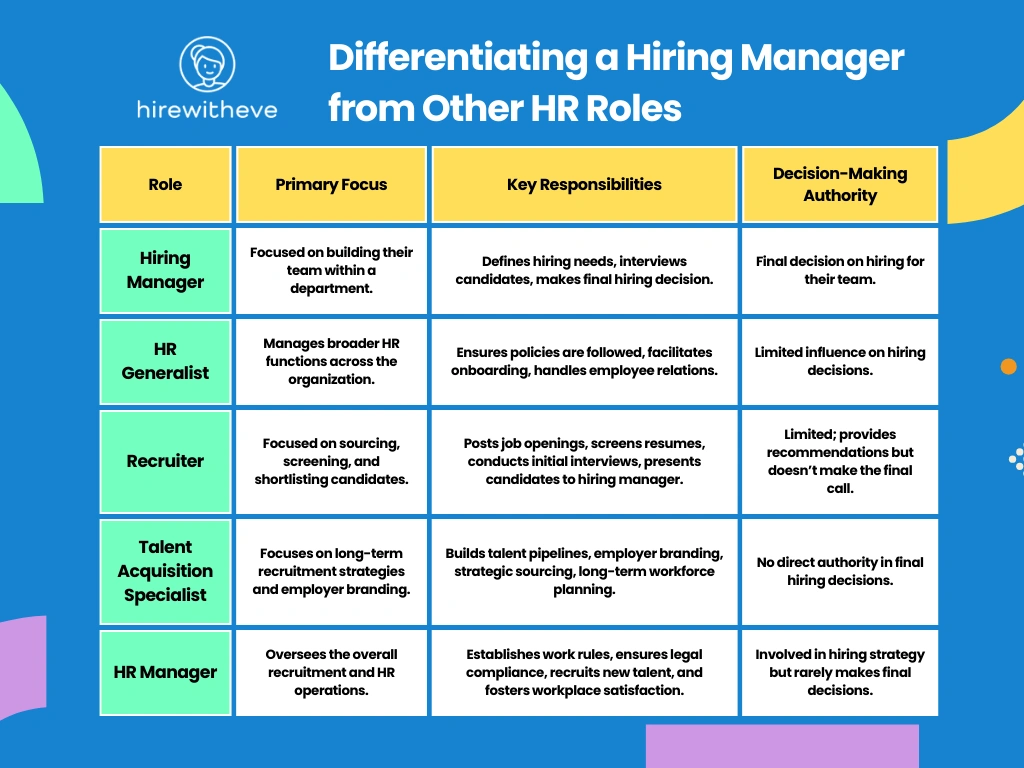What is a Hiring Manager: An In-Depth Overview
What is a Hiring Manager: An In-Depth Overview

What is a hiring manager? In every organization, this role is critical for talent acquisition. A hiring manager is the person within a department or team responsible for deciding who gets hired. They collaborate with HR departments and talent acquisition specialists to ensure that the candidates they choose meet the department's specific needs.
But what is a hiring manager beyond just the person responsible for hiring decisions? A hiring manager works closely with recruiters and HR specialists, playing an essential role in shaping a team's future. This blog aims to answer "What is a hiring manager" in detail and explain why their role is fundamental in the talent acquisition process. Additionally, we’ll explore how platforms like HirewithEve can streamline this role.
Table of contents
Key Responsibilities of a Hiring Manager
What is a Hiring Manager’s Role in the Hiring Process?
Differentiating a Hiring Manager from Other HR Roles
Skills Required for an Effective Hiring Manager
How HirewithEve Can Help You Manage Hiring Managers Effectively?
What is a Hiring Manager’s Impact on Candidate Experience?
What is a Hiring Manager’s Role in Skills-Based Hiring?
Common Challenges Faced by Hiring Managers
How Technology Can Support Hiring Managers: The HirewithEve Solution
Conclusion: Why HirewithEve is the Perfect Tool for Supporting Hiring Managers
Key Responsibilities of a Hiring Manager
What is a hiring manager without clear responsibilities? Hiring managers play a pivotal role in shaping the workforce of their department. Here are their key responsibilities:
Identifying Hiring Needs: One of the most fundamental tasks of a hiring manager is recognizing the gaps in their department or team. Whether due to a vacancy, an expansion, or the need for new skill sets, hiring managers must define the roles that need to be filled. This process includes understanding the exact requirements for the position and ensuring that the job description accurately reflects the needs of the role. Hiring managers work closely with their teams to anticipate upcoming challenges and opportunities, ensuring that their workforce is prepared to meet them.
Creating Job Descriptions: Once the hiring needs are identified, the hiring manager collaborates with HR to draft clear and detailed job descriptions. These descriptions are essential for attracting the right candidates, as they outline the role's responsibilities, necessary qualifications, and what the company expects from potential hires. The more specific and tailored a job description is, the better the chances of finding a qualified candidate who fits both the technical and cultural requirements of the team.
Interviewing Candidates: Hiring managers participate in the interview process, often as the final gatekeeper before a hiring decision is made. While HR and recruiters may handle initial screenings and assessments, the hiring manager is responsible for determining whether the candidate will succeed within their team. During interviews, they assess not only the candidate's technical skills but also their potential to work well with the team, adapt to the company culture, and contribute to long-term goals.
Making the Final Decision: The hiring manager is typically the one who makes the final hiring decision. After reviewing feedback from HR, recruiters, and other interviewers, the hiring manager weighs all information to choose the best candidate for the job. This responsibility also includes negotiating the final offer, and ensuring it aligns with both the company's budget and the candidate's expectations.
These core responsibilities shape what is a hiring manager’s critical role in building a successful team. Their expertise and insight make them invaluable during the hiring process.
What is a Hiring Manager’s Role in the Hiring Process?
What is a hiring manager’s role in the overall hiring process? They are at the center of the action. While HR and recruiters might manage logistics, sourcing, and initial screening, the hiring manager’s responsibility is far more direct and specific to the needs of their department.
Hiring managers are typically involved from the very beginning, helping HR teams understand the exact qualifications and traits necessary for the role. This sets the tone for sourcing efforts. After initial screenings, hiring managers step in to take part in interviews and assess whether a candidate fits their team’s needs.
One of the most crucial points of a hiring manager’s involvement is their ability to evaluate candidates not just based on their qualifications but also on their team fit and cultural compatibility. A candidate might excel on paper, but it is the hiring manager’s judgment that determines if they will thrive in the department and contribute to long-term goals.
Additionally, hiring managers play a pivotal role in decision-making. After the interviews and assessments, they review all gathered information and feedback from HR, test results, and their impressions to make the final hiring decision. This responsibility makes them a critical cog in the hiring process machine, ensuring the organization brings in individuals who will have a lasting positive impact.
Differentiating a Hiring Manager from Other HR Roles
To understand what is a hiring manager, it's important to distinguish their role from other key HR professionals involved in the hiring process. While all these roles work together, their specific functions, responsibilities, and focus areas differ. The table below provides a clear comparison:

The hiring manager's responsibilities are distinct from other HR roles in a few key ways. What is a hiring manager when compared to recruiters or HR specialists? While recruiters focus on sourcing talent and HR generalists manage the overall employee experience, the hiring manager is ultimately the decision-maker who builds their department by selecting the best candidates for the job.
The hiring manager's role is heavily department-focused, ensuring that the candidates hired have the right skills, cultural fit, and potential for long-term success within the specific team. In contrast, HR professionals like recruiters and talent acquisition specialists are primarily concerned with finding a broad range of qualified candidates, leaving the final decision to the hiring manager.
Hiring managers work closely with these HR professionals but operate with a more targeted approach to align team goals with company-wide objectives. The ability to make the final decision gives hiring managers a unique position within the hiring process.
Skills Required for an Effective Hiring Manager
What is a hiring manager without the right skills? To succeed in their role, hiring managers need a diverse set of skills that go beyond merely assessing technical qualifications. Here are the essential skills for any hiring manager:
Communication Skills: Hiring managers need to communicate effectively with a wide variety of people, from HR and recruiters to candidates and their future team members. They must articulate the needs of the role clearly and concisely to ensure that everyone involved in the hiring process understands what is expected. Good communication also helps in providing constructive feedback to candidates, whether they are successful or not.
Analytical Skills: Hiring managers are tasked with making decisions that will impact the team’s performance and productivity. They need to be analytical and detail-oriented to assess the skills, experience, and qualifications of each candidate. Beyond just analyzing resumes, hiring managers evaluate personality traits, work ethic, and potential growth to make the right decision.
Decision-Making Skills: Ultimately, the hiring manager has to make the final decision on which candidate to hire. This requires confidence in their judgment and the ability to make tough decisions, especially when faced with multiple highly qualified candidates. The decisions they make can have a long-lasting impact on the department’s success, so a hiring manager must weigh all the factors and trust their instincts.
Collaboration: Although the hiring manager makes the final call, they do not operate in a vacuum. They must collaborate closely with HR teams, recruiters, and sometimes other departments to ensure they’re hiring the right person. This collaboration requires a good understanding of the bigger picture within the organization and the ability to work well with others to achieve the best outcome.
Hiring managers who excel in these areas is not only effective but also crucial to the overall success of the organization.
How HirewithEve Can Help You Manage Hiring Managers Effectively?
The platform’s features are designed to streamline the responsibilities of hiring managers. When discussing "what is a hiring manager," it’s essential to highlight how HirewithEve can improve efficiency:
Analytics and Insights: The platform may offer analytics features to provide insights into hiring trends, candidate performance, and the effectiveness of various hiring strategies.
Skills-Based Hiring: The platform emphasizes the importance of hiring based on skills rather than just credentials or past job titles. This approach allows employers to find candidates who are a better fit for specific roles, especially in industries where specific skill sets are crucial.
Collaboration Tools: The platform improves collaboration between hiring managers and HR teams.
Remote Hiring Support: Given the shift towards remote work, the platform likely includes features that help companies find and hire the best talent from anywhere in the world, breaking down geographical barriers.
ATS (Applicant Tracking System) Integration: HirewithEve might offer integration with ATS platforms to improve the efficiency of the hiring process, making it easier for HR teams to track and manage candidates.
What is a hiring manager’s role when using technology like HirewithEve? It simplifies their tasks, allowing them to focus on making decisions backed by concrete data.
What is a Hiring Manager’s Impact on Candidate Experience?
The candidate experience is a crucial part of the hiring process, and what is a hiring manager without the ability to create a positive interaction with potential hires? Hiring managers often serve as the face of the company during the interview process, setting the tone for how candidates perceive the organization.
By using HirewithEve, hiring managers can maintain better communication, ensure a smoother interview process, and provide timely feedback, all crucial for enhancing the candidate experience.
What is a Hiring Manager’s Role in Skills-Based Hiring?
Skills-based hiring is rapidly becoming a best practice in modern talent acquisition, and it’s essential to understand what is a hiring manager in this context. Hiring managers ensure that candidates have the skills needed for the job. They focus less on traditional credentials and more on practical abilities, a practice fully supported by the tools on HirewithEve.
With features like skills-based assessment tools, HirewithEve makes it easier for hiring managers to focus on finding candidates whose skills match their specific job requirements.
Common Challenges Faced by Hiring Managers
Even the most experienced hiring managers face challenges. What is a hiring manager without the struggles that come with the responsibility of finding and selecting the right talent? Here are some of the most common challenges:
Finding the Right Fit: One of the biggest challenges hiring managers face is finding the perfect candidate. Even after reviewing countless resumes and conducting interviews, it can be tough to find someone who meets all the qualifications and fits seamlessly into the team. Often, compromises must be made, whether it’s in terms of experience or skills, which can make the decision even more difficult.
Bias in Hiring: Unconscious bias is a significant issue in the hiring process. Even with the best intentions, hiring managers can sometimes favor candidates based on personal biases rather than qualifications and fit. Overcoming these biases is crucial to ensure a fair and objective hiring process that brings in diverse talent. Implementing structured interviews and standardized evaluations can help mitigate bias, but it remains a challenge in many organizations.
Time Constraints: Hiring managers often have to juggle their regular responsibilities with the hiring process, which can be time-consuming. Reviewing resumes, scheduling interviews, and coordinating with HR can take up a significant portion of a manager’s time, leaving less room for their daily tasks. This time crunch can lead to rushed decisions or a prolonged hiring process, both of which have negative consequences for the organization.
Managing Candidate Expectations: Today’s job market is competitive, and candidates often have high expectations. Managing these expectations whether related to salary, job responsibilities, or career advancement can be tricky for hiring managers. Offering an attractive package while staying within the company’s budget and guidelines can be a fine balancing act.
Navigating Internal Politics: Sometimes, the challenge doesn’t lie with the candidates but with internal pressures. Different stakeholders within the organization may have varying opinions about the ideal candidate. Hiring managers must navigate these politics to make a decision that benefits the team without causing friction within the organization.
Hiring managers must be skilled at overcoming these challenges to successfully fill open positions and maintain the health and productivity of their teams. What is a hiring manager if not someone who can tackle these obstacles head-on?
How Technology Can Support Hiring Managers: The HirewithEve Solution
What is a hiring manager’s most valuable resource? Time. Using technology effectively can save time and improve results. HirewithEve supports hiring managers by automating many parts of the process, such as skills-based assessments, and data-driven insights, enabling them to focus on a final selection.
The platform’s collaborative tools also ensure smoother communication between HR teams and hiring managers, allowing everyone to stay on the same page during the recruitment process.
Conclusion: Why HirewithEve is the Perfect Tool for Supporting Hiring Managers
To summarize, what is a hiring manager? They are the final decision-makers in the hiring process, responsible for building strong teams. Using a platform like HirewithEve makes this role easier, faster, and more data-driven.
With key features such as skills-based hiring tools, data insights, and collaboration features, HirewithEve is the perfect solution for talent acquisition specialists and HR managers looking to empower hiring managers to make the best decisions.
Target Your Talent
Unlock tailored solutions for your recruitment and hiring needs with Eve Platform's extensive case study library.
Subscribe now to enhance your HR expertise and excel in your role.
Free Resources

Transforming Hiring: 7 Key Recruiting Metrics
Enhancing recruitment processes with data-driven insights for better hiring outcomes.

Reducing Hiring Bias with Hirewitheve.
Utilizing Hirewitheve to combat bias and streamline recruitment processes effectively.

Hiring Detail-Oriented Candidates
HirewithEve enhances hiring by accurately assessing candidate's attention to detail-oriented.
